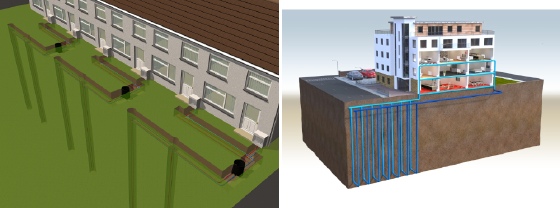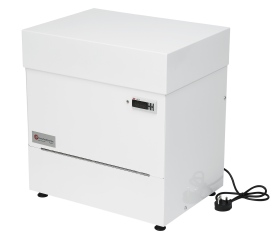Commercial incentives for domestic heat pumps

How can you bring commercial RHI and other incentives to domestic heating using heat pumps? Chris Davis of Kensa Heat Pumps describes an approach.
Whether in the design and construction of new homes or installations of replacement heating systems, there’s a compelling need for housing developers, social-housing providers and private landlords to provide their customers with the lowest running costs possible. This is never more true than in rural areas that are off the gas grid.
However, with the domestic Renewable Heat Incentive (RHI) unavailable for new-build developers and unable to present a compelling case for social landlords, the opportunity for larger-scale residential projects could well lie with district-heating solutions and the recently enhanced non-domestic phase of the RHI.
Significantly for the residential sector, the non-domestic RHI also covers the more complex district-heating systems, both for existing buildings and — unlike the domestic RHI — new build. This opens up significant opportunities for renewable heat to residential developers and social-housing providers by considering a district-heating approach.
And with the significantly more appealing non-domestic RHI tariff rates for ground-source heat pumps now confirmed, this is an area that specifiers and installers would do well to familiarise themselves with as a viable and attractive solution to the residential market, particularly for new build and social housing.
District heating currently provides less than 2% of the UK’s heat demand, but is an area Department of Energy & Climate Change (DECC) is keen to see increase. Talk to any building-services professional about district heating and it immediately conjures up images of large, centralised boiler, biomass or CHP plant — hardly appropriate for small to medium-scale residential schemes. However an approach being pioneered by Kensa Heat Pumps utilising the Shoebox heat pump and a district borehole array is beginning to open up significant opportunities for renewable heat to residential developers and social-housing providers.
 |
| Centralised boreholes serving heat pumps in each dwelling is a totally scalable approach and attracts commercial-type incentives. |
Using compact and extremely quiet ground-source heat pumps specifically intended to be installed within each property provides each occupier complete control over their own heating and hot-water system and responsibility for their own bill. Multiple heat pumps are then linked to a communal ground array, which enables the system to satisfy the definitions of district heating under the RHI.
This approach also overcomes many of the drawbacks of traditional ‘central plant’ district-heating systems — namely lack of control and energy loss through the distribution system. With this kind of communal ground array, it is the cooler ground-side water that is distributed centrally, with each home producing hot water for its heating system via its own individual ground-source heat pump.
The solution is also completely scalable in that a district heating system may be as small as two dwellings — perhaps a pair of semi-detached houses — sharing a common borehole. This flexibility therefore enables developers to employ an innovative technical solution while retaining ownership of the system and benefit from the RHI or for social housing providers and other owners of multiple dwellings such as holiday-let providers to adopt a scalable approach to district heating across their off-gas-grid housing stock.
Compared with the likely alternative in off-gas-grid areas of fitting individual air-source heat pumps to each property — with no possibility of RHI benefit in new-build and an unattractive rate of return under the domestic RHI for retro-fits — the district ground-source solution, combined with the recently announced increased non-domestic RHI tariffs means the financial case is compelling. For new-build housing developers, the district-scheme approach provides a neat solution to attract lucrative RHI funding, mitigating the additional costs of fitting renewable heat over traditional solutions. Index-linked payments extending for 20 years based upon the metered output from the ground-source heat pumps are made to the owner of the installation or, in some circumstances, to the funder, who retains ownership for the duration of the RHI scheme.
 |
| Kensa's Shoebox ground-source heat pump is ideal for new-build apartments and qualifies for the RHI Phase 1 when specified as a district-heating system. |
Better still, retro-fit district-heating schemes in off-gas-grid areas in the social-housing sector can also attract additional funding via the Energy Company Obligation (ECO). Paid as an upfront grant, ECO contributions are especially attractive where ground-source heat pumps displace electric or oil heating in homes in designated rural areas.
And with RHI and ECO able to sit alongside one another, the financial case is clearly a compelling one, especially when compared with the alternative options. For social-housing providers, a retrofit ground-source heat pump district scheme able to attract ECO funding will have a lower capital cost than fitting individual air-source heat pumps and provide a significantly more attractive rate of return under the non-domestic stream of the RHI than the proposed domestic scheme.
The renewable-heat industry is heading for exciting times, and heat pumps are clearly an excellent alternative to traditional heating and hot-water systems, particularly for those homes not connected to the gas grid. So when looking at renewable solutions for multiple residential properties — either new build or retro-fit — district ground source heat pump solutions could well provide the answer.
Chris Davis is commercial director of Kensa Heat Pumps.







